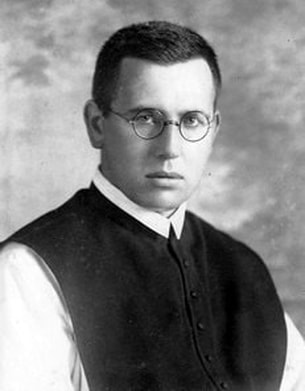Hadarits changed his name shortly after he was ordained into the priesthood. The adopted surname is a direct reference to the village from which he hailed, which was known simply as Endréd at the time of his birth in 1895 (it is now called Fertőendréd).
After he completed his studies at a Benedictine school in Györ, Endrédy became a monk, entered teaching, and was eventually elected as the Abbot of the Cistercian Abbey in Zirc, but he is remembered primarily for a choice he made in 1948 when he was a fifty-three-year-old man.
The Second World War devastated the abbey’s schools; however, the devastation of war could not rival the devastation the communists inflicted upon the schools when they took them over in 1948. With no hope on the horizon, Endrédy fled to Rome, but he did not stay there long. Knowing he faced imprisonment or worse, Endrédy chose to return to his beloved abbey in Zirc. Upon his return, he brought a message from Pope Pius XII to Cardinal Mindszenty, who the communists had placed under house arrest on December 26, 1948.
In 1950, the communists took over the Cistercian Abbey itself. Endrédy was the last to leave, but he did not get far. The communists arrested him four days later in Budapest. After surviving a ruthless regimen of torture, Endrédy was sentenced to 14 years in prison in 1951. The communists forced him to spend the first six of these in utter isolation where he was denied practically everything that may have maintained a connection to the outside world. He was even denied reading material, writing utensils, and paper. After these six terrible years, the communists transferred the 62-year-old Endrédy to a home for aged clerics in Pannonhalma, where lived until his death in 1981.
Whenever I read about a man like Endrédy, I can’t help but compare him to our current crop of clergy and reflect upon the actions churches took during the birdemic in 2020.
Endrédy’s escape to Rome in 1948 is perfectly understandable and justifiable. The situation in Hungary had become hopeless. His freedom and life were both in peril. He could have easily continued his career in Rome. He could have taken a safe and cushy job somewhere in the Vatican, and from that position he could have devised some way to liberate his abbey from the communists. Or he could have just put it all behind him and bidden his time until communism weakened or collapsed.
But he didn’t do any of that. He chose to return. He knew he would be arrested, humiliated, tortured, and imprisoned when he returned, but he returned anyway. When I read about a man like Endrédy, I can’t help but wonder what he would have done had he been the priest of the little church in my village in 2020. Would he have locked the doors as the current priest did? Or would he have chosen differently?
It’s difficult to say. If anything might provide a clue, it is Endrédy’s writings. After suffering through six years of isolation, Endrédy was finally granted access to writing utensils and notebooks. In one of those notebooks, he wrote the following:
Lord, grant that we may be worthy of freedom.
This, from the pen of a man who – from the perspective of most modern people – escaped to freedom in 1948, but decided to give up this freedom and return to his home country to be tortured and imprisoned – which begs the question:
What is the nature of the freedom to which Endrédy refers?
Well, I posit it’s the sort of freedom that nearly all mainstream churches blatantly rejected in 2020 under the guise of loving one’s neighbor.
Speaking of love, Endrédy also had something interesting to say on that subject:
The world has become hell, and the people no longer believe. A superhuman task awaits us; to once again convince the world that God loves.


 RSS Feed
RSS Feed

